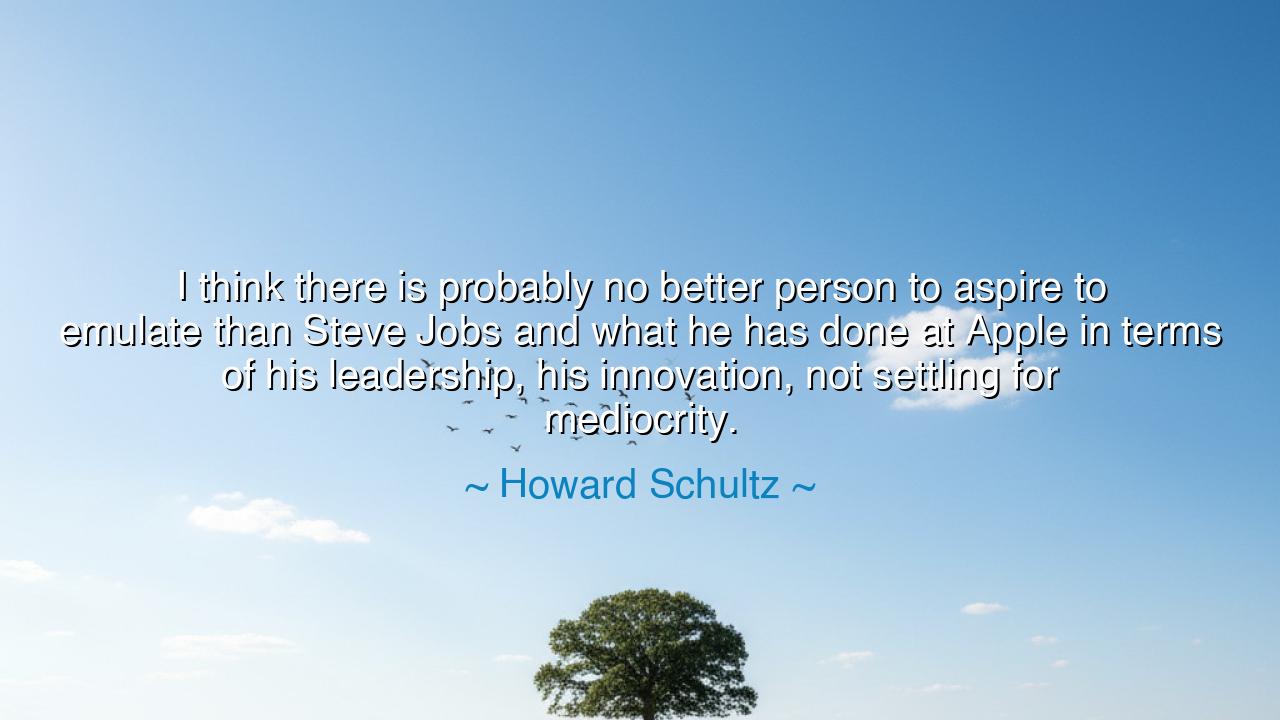
I think there is probably no better person to aspire to emulate
I think there is probably no better person to aspire to emulate than Steve Jobs and what he has done at Apple in terms of his leadership, his innovation, not settling for mediocrity.






Hear the voice of Howard Schultz, the builder of Starbucks, who spoke with reverence of another builder of worlds: “I think there is probably no better person to aspire to emulate than Steve Jobs and what he has done at Apple in terms of his leadership, his innovation, not settling for mediocrity.” In this reflection lies a hymn to leadership and innovation, and a warning against the creeping poison of mediocrity. Schultz does not speak lightly, but points to Jobs as an exemplar—a figure whose restless pursuit of excellence transformed not only a company, but the very rhythm of modern life.
For leadership, as Schultz praises it, is not merely directing others but igniting them. Jobs was not content to follow the beaten paths of commerce; he carved new ones through vision and intensity. He led not with softness, but with the fire of conviction, demanding that those around him see not only what was but what could be. His leadership was fierce, sometimes difficult, but it awakened in his people the hunger to create what seemed impossible. This is why Schultz honors him: for a leader who tolerates only mediocrity creates followers, but a leader who refuses mediocrity creates revolutionaries.
And what of innovation? Jobs lived in its very marrow. He wove together technology and beauty, utility and art. The Macintosh, the iPod, the iPhone—these were not merely products, they were symbols of what happens when imagination is wedded to execution. He saw further because he dared to imagine differently, and he achieved more because he demanded unyielding excellence in bringing those dreams to life. Schultz’s words remind us that true innovation is not an accident, but the fruit of relentless pursuit, guided by vision and sharpened by discipline.
The ancient world, too, knew this pattern. Consider Leonardo da Vinci, whose restless mind leapt from painting to engineering, from anatomy to flight. Like Jobs, he was never content with mediocrity. His notebooks are filled not with safe repetitions, but with bold visions centuries ahead of his time. He, too, led by inspiring others to see beyond the ordinary. Just as Jobs transformed Apple from a struggling company into a global icon, so Leonardo transformed the understanding of art and science by refusing to settle for what already was.
The deeper wisdom of Schultz’s praise is this: mediocrity is the great enemy of human potential. It is comfort disguised as success, stagnation cloaked as stability. To settle for mediocrity is to betray the gifts of the mind and the possibilities of the spirit. Jobs, in his refusal to accept the ordinary, proved what happens when one wages war against mediocrity—he elevated the standards not only of his company, but of the world that watched him. In honoring him, Schultz calls us to rise above our own complacency.
The lesson, then, is clear: seek out models of greatness, and emulate them not by copying their steps, but by embodying their spirit. Aspire to leadership that inspires, to innovation that reshapes the possible, to a life that refuses the dullness of mediocrity. For the world has never been moved by those who accepted the ordinary; it has always been transformed by those who demanded the extraordinary.
Practical action flows from this wisdom: in your work, do not settle for “good enough.” Strive for excellence, even when it demands more of you. In your life, do not follow blindly, but ask how you may innovate, how you may create new value, new beauty, new hope. If you lead others, awaken in them the hunger for greatness, not the comfort of mediocrity. And if you follow, let your following be active—absorbing, learning, and preparing to create in your own right.
So remember always Schultz’s tribute: Steve Jobs is a symbol of leadership, innovation, and the refusal to settle for mediocrity. Do not let these remain only in his story. Carry them into your own. For when you lead with vision, create with boldness, and rise above the ordinary, you too will leave a mark that endures beyond your days—a mark upon people, upon the world, and upon the future yet to come.






AAdministratorAdministrator
Welcome, honored guests. Please leave a comment, we will respond soon